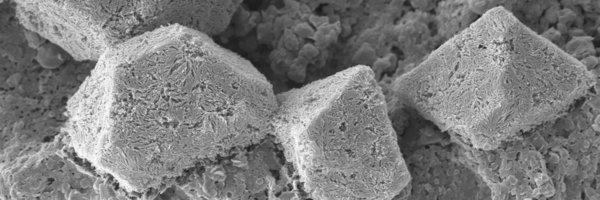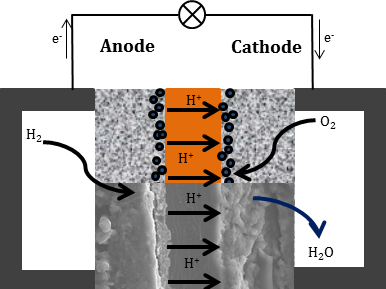
Structural and spectroscopic investigation of polymer based fuel cells
The progressing climate change on the one hand and our increasing demand of energy supply combined with a decreasing stock of natural resources on the other hand constrain us to focus on alternative, renewable energy suppliers. One of the many viable solutions therefore are fuel cells (FCs) which are devices that enable us to convert the chemical energy of a fuel into electrical energy via catalyzed reactions on electrodes. This project focusses on high-temperature polymer electrolyte membrane fuel cells (HT-PEMFCs).
On the way towards maximum efficient FC performances there are several drawbacks that have to be overcome. One of the major issues are degradation processes that occur during FC operation. Diffusion of the atomic species or decomposition of the materials result in decreasing FC efficiencies or even short circuits and gas leaks. Extended FC operation times as well as multiple shut-down and start-up procedures of a FC stack generally exaggerate degradation. To comprehend degradation processes and refer them to their cause, FCs - before and after operating times of up to several months - are investigated. Different catalyst and catalyst support materials are tested to determine the relationship between FC efficiency and operational degradation. As catalyst material different noble metals and alloys are tested, as catalyst support material different high surface area carbon materials as well as transition metal oxides are utilized.

The assembly of a HT-PEMFC is shown in the displayed image. The polybenzimidazole-based (PBI-based) membrane in the middle and the adjacent electrodes – anode and cathode – built the so called membrane-electrode assembly (MEA) where FC-specific redox reactions take place.
Via electron microscopic methods like conventional transmission electron microscopy (CTEM), high- resolution TEM (HRTEM), Scanning TEM (STEM), diffraction experiments, electron energy loss spectroscopy (EELS) and energy-dispersive X-ray spectroscopy (EDX) the different electrode materials as well as the catalyst are investigated regarding their suitability for use in FC applications. In particular we are interested to understand the microstructural changes occurring during operation.
